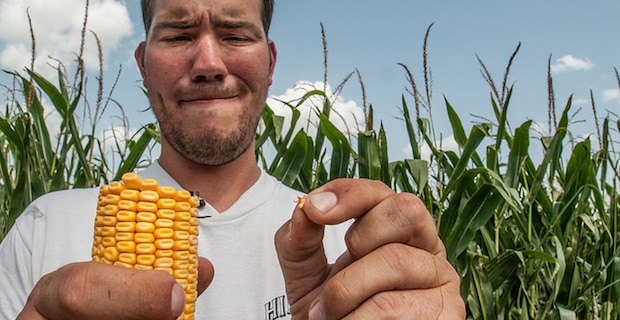
The safety of genetically modified organisms (GMOs) is among the most hotly debated topics surrounding our food supply. Now the results of a new study provide strong evidence that GMO corn and soy may damage vital organs.
Dow, DuPont, Monsanto, and Syngenta claim their GMO corn, soy, and other food crops are safe, and they have clear economic reasons for standing their ground. Fortunately, there are experts who are concerned about the short-term and long-term health and environmental implications of GMOs. One such team recently published their findings of the biological impact of feeding rats GMO corn and soy.
Read about the most common GMO foods
GMO corn and soy study
Two groups of rats were involved in the 3-month-long study. One group of 30 was fed a GMO diet consisting of 60% corn and 34% soybeans while the other group was fed a non-GMO diet containing wheat. The nutritional value of both diets was the same and both groups of rats started their diets at weaning. The presence of genetically modified components was verified using a polymerase chain reaction test.
Overall, here’s what the researchers observed when they tested the rats in each group at 30, 60, and 90 days.
- In the rats fed the GMO diet, there was a marked increase in the levels of AST (aspartate aminotransferase) and ALT (alanine aminotransferase), which are biochemical factors associated with liver damage and inflammation.
- At 30 days, there was evidence of kidney damage in the rats on the GMO diet. The damage showed as hemorrhaging and a widening of the tubules, structures that are critical for proper functioning of the kidneys.
- Protein content in the liver declined significantly in the rats fed the GMO diet after as little as 30 days. This indicates malfunction of hepatocytes, the cells in the liver that perform the majority of the organ’s functions, including metabolism, digestion, bile production, and storage.
- Uric acid concentrations and blood creatinine levels were also significantly increased in the rats on the GMO diet compared with the non-GMO diet group. Uric acid is associated with gout and kidney stones while high creatinine levels have been linked to kidney disease.
- Spermatocytes (infant sperm cells) in the rats fed the GMO diet showed a significantly increased number of cells with chromosomal aberrations.
- The GMO diet also was associated with an increased ratio of DNA fragmentation in the liver cells when compared with the control group.
Read more about lies about GMOs and GMO labeling
The researchers in this study concluded that their findings “indicate that there are health hazards linked to the ingestion of diets containing genetically modified components.” These findings illustrate some of the clearest evidence to date of the impact of GMOs on health.
Source: Oraby H et al. Biological impact of feeding rats with a genetically modified-based diet. Turkish Journal of Biology 2015 Jan.
Image: U.S. Department of Agriculture




